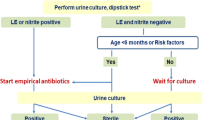Abstract
Infection of the urinary tract is the most common infectious complication of renal transplantation. The microbiology of post-transplant urinary tract infections is similar to what is seen in the general population, although transplant patients may develop infections due to unusual or opportunistic pathogens. The optimal management of urinary tract infections in renal transplant recipients is poorly studied, but recommendations for treatment are available. Antibiotic prophylaxis can reduce the risk of bacterial infection of the urinary tract post-transplant but is not used in all transplant centers. The influence of urinary tract infection on graft survival requires further study.
Similar content being viewed by others
References and Recommended Reading
UNOS, Richmond Virginia and the Division of Transplantation, Bureau of Health Resources and Services Administration, U.S. Department of Health and Human Services 1996 Annual Report of the U.S. Scientific Registry for Transplant Recipients and the Organ Procurement and Transplantation Network: Transplant Data: 1988–1995. Rockville, MD.
Tolkoff-Rubin NE, Rubin RH: Urinary tract infection in the immunocompromised host. Infect Dis Clin North Am 1997, 11:707–717. A thoughtful review of the pathogenesis of UTI with special reference to renal transplant patients and patients infected with HIV.
Schmaldienst S, Hörl WH: Bacterial infections after renal transplantation. Nephon 1997, 75:140–153.
Takai K, Tollemar J, Wilczek HE, et al.: Urinary tract infections following renal transplantation. Clin Transplantation 1998, 12:19–23. One of the most recent large series addressing the risk of UTI after renal transplantation.
Abbott KC, Oliver JD, Hypolite I, et al.: Hospitalizations for Bacterial Septicemia after renal transplantation in the United States. Am J Nephrol 2001, 21:120–127.
Smets YFC, van der Pijl JW, van Dissel JT, et al.: Infectious disease complications of simultaneous pancreas kidney transplantation. Nephrol Dial Transplant 1997, 12:764–771.
Boonstra JG, Bruijn JA, Hermans J, et al.: The incidence of interstitial and vascular kidney rejection after pancreas transplantation. J Am Soc Nephrol 1995, 5:1918–1925.
Pirsch JD, Odorico JS, D’Alessandro AM, et al.: Post-transplant infection in enteric versus bladder-drained simultaneous pancreas-kidney transplant recipients. Transplantation 1998, 66:1746–1750.
Sagalowsky AI, Ransler CW, Peters PC, et al.: Urologic complications in 505 transplants with early catheter removal. J Urol 1983, 129:929.
Rabkin DG, Stifelman MD, Birkhoff J, et al.: Early catheter removal decreases incidence of urinary tract infections in renal transplant recipients. Transplant Proc 1998, 30:4314–4316.
Renoult E, Aouragh F, Mayeux D, et al.: Factors influencing early urinary tract infections in kidney transplant recipients. Transplant Proc 1994, 26:2056–2058.
Salahi H, Malek-Hosseini SA, Ghahramani N, et al.: The efficacy of ureteralstents in prevention of urological complications in renal transplantation. Transplant Proc 2001, 33:2668.
Dimitrakov D, Dimitrakov J, Beleva R: Frequency and clinical characteristics of mycoplasma urinary tract infections in the early post-transplantationperiod in renal allograft patients. Folia Medica 1999, 41:59–61.
Aguado JM, Morales JM, Salto E, et al.: Corynebacterium urealyticum: a new and threatening pathogen for the renal transplant patient. Transplant Proc 1993, 25:1493–1494.
Allerberger FJ, Dierich MP, Ebner A, et al.: Urinary tract infection caused by nontyphoidal Salmonella: report of 30 cases. Urol Int 1992, 48:395–400.
Latib MA, Pascoe MD, Duffield MS, et al.: Microsporidiosis in the graft of a renal transplant recipient. Transplant Int 2001, 14:274–277.
Dowdy L, Ramgopal M, Hoffman T, et al.: Genitourinary tuberculosis after renal transplantation: report of 3 cases and review. Clin Infect Dis 2001, 32:662–666.
Hadaya K, Akposso K, Costa de Beauregard MA, et al.: Isolated urinary aspergillosis in a renal transplant recipient. Nephrol Dial Transplant 1998, 13:2382–2384.
Shirwany A, Sargent SJ, Dmochowski RR, et al.: Urinary tract aspergillosis in a renal transplant recipient. Clin Infect Dis 1998, 27:1336.
Charra B, Calemard E, Ruffet M, et al.: Survival as an index of adequacy indialysis. Kidney Int 1992, 41:1286–1291.
Andrews CA, Shan KV, Daniel RW, et al.: A serologic investigation of BK virus and PC virus infections in recipients of renal allografts. J Infect Dis 1988, 158:176–181.
Howell DN, Smith SR, Butterly DW, et al.: Diagnosis and management of BK Polyomavirus interstitial nephritis in renal transplant recipients. Transplantation 1999, 68:1279–1288.
Muñoz P: Management of urinary tract infections and lymphocele in renal transplant recipients. Clin Infect Dis 2001, 33(Suppl 1):S53-S57. A recently published, evidenced-based guideline for the management of UTI in transplant patients.
Naber KG, Bergman B, Bishop MC, et al.: EAU guidelines for the management of urinary and male genital tract infections. Eur Urol 2001, 40:576–588.
Franz M, Hörl WH: Common errors in diagnosis and management of urinary tract infection. II: Clinical management. Nephrol Dial Transplant 1999, 14:2754–2762.
Fox BC, Sollinger HW, Belzer FO, et al.: A prospective, randomized, double-blind study of trimethoprim-sulfamethoxazole for prophylaxis of infection in renal transplantation: clinical efficacy, absorption of trimethoprim-sulfamethoxazole, effects on the microflora, and the cost-benefit of prophylaxis. Am J Med 1990, 89:255–274.
Maki DG, Fox BC, Kuntz J, et al.: A prospective, randomized, double-blind study of trimethoprim-sulfamethoxazole for prophylaxis of infection in renal transplantation. Side effects of trimethoprim-sulfamethoxazole, interaction with cyclosporine. J Lab Clin Med 1992, 119:11–24.
Moysés-Neto M, Costa RS, Reis MA, et al.: Use of ciprofloxacin as a prophylactic agent in urinary tract infections in renal transplant recipients. Clin Transplantation 1997, 11:446–452.
Heemann UW, Azuma H, Tullius SG, et al.: Infections and reduced functioning kidney mass induce chronic rejection in rat kidney allografts. Clin Nephrol 1996, 46:34.
Mehraban D, Nowroozi A, Naderi GH: Urinary tract infection vs renal allograft rejection. Transplant Proc 1995, 27:2712–2714.
Author information
Authors and Affiliations
Rights and permissions
About this article
Cite this article
Brown, P.D. Urinary tract infections in renal transplant recipients. Curr Infect Dis Rep 4, 525–528 (2002). https://doi.org/10.1007/s11908-002-0040-0
Issue Date:
DOI: https://doi.org/10.1007/s11908-002-0040-0




